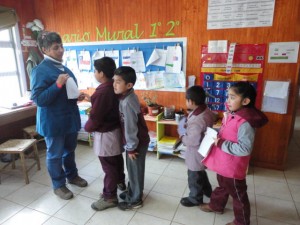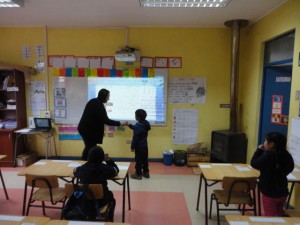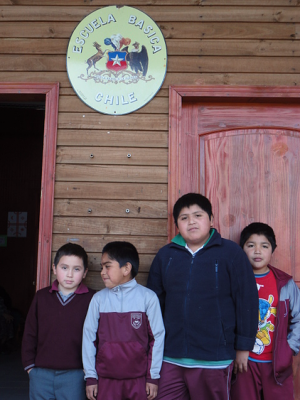By Nicholas Bobadilla
In May 2015, Cristobal Madero, a Chilean native and PhD student in UC Berkeley’s Graduate School of Education, invited 14 of Chile’s most elite high schools to participate in a novel educational experiment.
The motivation for the experiment was simple: to mitigate tensions between Chilean citizens and the Mapuche, a group indigenous to the country for 12,000 years. But the method was less straightforward: send high schools teachers to meet with Mapuche communities, so that the educators could bring back accurate information to their students—who are destined to become Chile’s leaders and will likely control the fate of this long maligned, and increasingly impoverished, group.
 “The conflict between the Chilean state and Mapuche people has been in place for 500 years,” said Madero. “My question was: How is it possible that this problem is still there?”
“The conflict between the Chilean state and Mapuche people has been in place for 500 years,” said Madero. “My question was: How is it possible that this problem is still there?”
In April 2015, Madero founded an educational organization called Kuy Kuitin, which means “building bridges” in the Mapuche dialect. To expand his idea, Madero entered Kuy Kuitin in the Big Ideas@Berkeley contest with Daniel Cano, a PhD candidate in history at Georgetown University whose research focuses on indigenous education in Chile and who also has a personal connection with the Mapuche people. A second place win in the 2015 Conflict & Development category enabled them to set their educational plan in motion.
“During the proposal process, Big Ideas contacted a sociologist specializing in Mapuche culture,” said Madero. “That was the key to going deeper and making the idea more realistic and rooted in the evidence and theory of multicultural education.”
Kuy Kuitin recently recruited five history teachers from the wealthiest schools in Santiago to shadow teachers in Mapuche schools for 10 days in April 2016. In addition to participating in activities within the Mapuche schools, the Santiago teachers will spend time with Mapuche families. Following the immersion, the teachers will incorporate information about Mapuche culture and history into their lessons and formally disseminate the information among their colleagues. Their students will later be surveyed to gauge the impact of the new curriculum.
Madero became familiar with the Mapuche and their history while in college, when he joined the Jesuits, a religious order within the Catholic Church known for dedication to service and social justice. In 2003, he took a two-week assignment with the Jesuits to acquaint himself with the culture and history of the indigenous group. He felt so activated by the experience that he has returned to learn from the Mapuche over the past 12 years, while working as a high school teacher throughout Chile, a master’s student in theology at Boston College, and most recently as a doctoral student in education at UC Berkeley.
 “I developed relationships with two families that made me realize how the Mapuche people are treated and received,” said Madero in response to why he started develop his educational program. “That’s one side of the answer. It was personal.”
“I developed relationships with two families that made me realize how the Mapuche people are treated and received,” said Madero in response to why he started develop his educational program. “That’s one side of the answer. It was personal.”
The other reason was grounded in Madero’s resolve to mitigate the ongoing conflict between the Mapuche and broader Chilean society. “I thought education would be a key to understanding and overcoming the problem.”
Madero said that Kuy Kuitin is targeting the wealthiest schools because in Chile the top earners control the country. “We don’t need to conduct research to know if wealthy people in Chile own all the mass media, own the forestry industry, have written the history of the country, have led the country… That’s a reality,” said Madero.
More specifically, the wealthiest students are most likely to assume the top political and corporate positions in the country, and as a result will have a hand in the Mapuche’s fate. In providing an alternate history, Kuy Kuitin aims to influence those who will be responsible for the social and economic future of the Mapuche and broader Chilean society.
The Mapuche have been the subject of violent and legislative displacement since the arrival of Spanish settlers in the 16th century. In 1881, the Chilean government seized 90 percent of Mapuche territory and moved the natives onto reservations. In recent decades, forestry companies have destroyed their land and jeopardized their agricultural livelihood through commercial tree farming. As a result, many Mapuche have migrated to urban areas, where they take low-paying jobs and are forced to the margins of society. They suffer from unemployment and illiteracy, which create stigmas of laziness and incompetence and result in various forms of discrimination.
Radical as well as peaceful Mapuche groups have protested maltreatment, only to be met by excessive police brutality and discriminatory anti-terrorism laws. Complicit in their plight is the mass media, which has extrapolated the behavior of a radical minority to the entire Mapuche population.
 “Because of the power a teacher has in a classroom, we might be able to convey that the Mapuche are not lazy, drunk, dark people who don’t like to work and that’s why they’re all poor. All those categories students in wealthy schools receive, they’re reproduced and they don’t do anything to overcome this,” argued Madero. “Maybe a teacher can be a good mediator of change.”
“Because of the power a teacher has in a classroom, we might be able to convey that the Mapuche are not lazy, drunk, dark people who don’t like to work and that’s why they’re all poor. All those categories students in wealthy schools receive, they’re reproduced and they don’t do anything to overcome this,” argued Madero. “Maybe a teacher can be a good mediator of change.”
Although the project has proven controversial for students whose families have been responsible for the oppression of the Mapuche, Madero admits the reception by many of the schools exceeded his and Cano’s expectations.
“In Santiago, we invited 14 schools and received answers from six of the them. It was risky because we are telling them, ‘You are our target for this reason [wealth].’ But those six schools got the message and they really understand and want to make a change.”
The project was also well received by the other side. “The Mapuche have been very welcoming and allowed us to go beyond what we were expecting,” said Madero. They have invited the teachers on trips to museums and other Mapuche landmarks.
Nevertheless, Madero is aware that such a small project cannot transform centuries of discrimination. He sees education as a “starting point,” and a means to convince the Chilean elite that most Mapuche are not violent. “There is violence and an extremist group using force,” he said, “but 99 percent live peacefully.”
During the second half of the project, the high school teachers will design and submit a training manual to the Teacher Training and Experimentation Center of the Ministry of Education. They will also publish academic papers, write articles for local and national newspapers, and communicate their experiences via social media. A documentary filmmaker has expressed interest in capturing the project. The final stage of Kuy Kuitin will entail submitting a proposal to the Intercultural Education Department of the Chilean Ministry of Education to amend school curriculums. In the end, Madero hopes the government will implement affirmative action policies to ensure fairer access to housing, education, and employment for the Mapuche.
Education is not a panacea for the conflict in Chile, but Madero is confident about the impact Kuy Kuitin can have, and hopes the organization will serve as a starting point for lasting change.
“I’m convinced education can be a good tool, not the only one, 0to overcome a lot of social problems and conflicts. That’s a belief.”